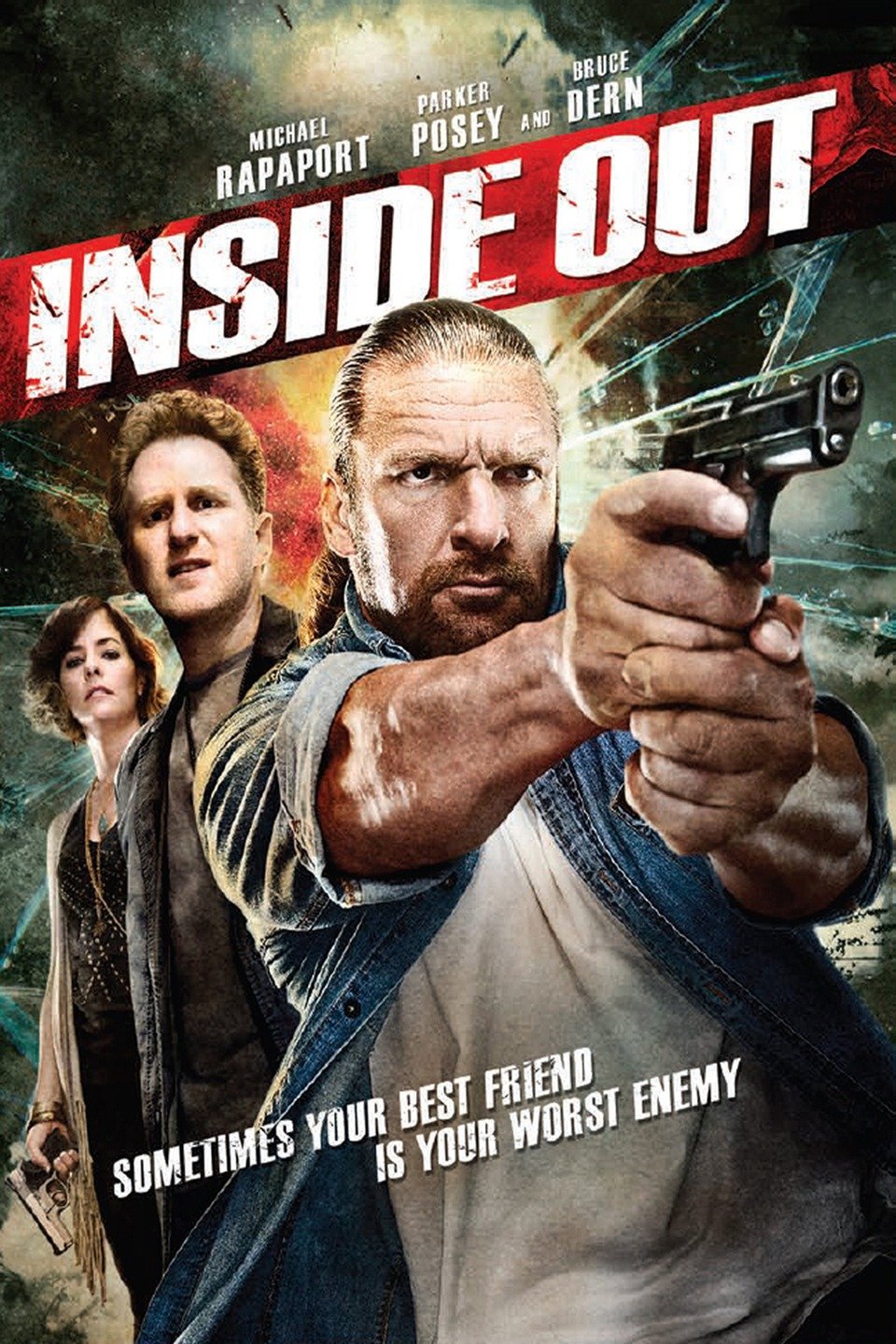A while ago I was browsing through Netflix when what should appear but “The Naked Man,” a 1998 movie about a wrestler with a “naked” gimmick starring Michael Rapaport. I immediately emailed RD and told him the big news: an obscure movie with “Wrestlecrap” written all over it.
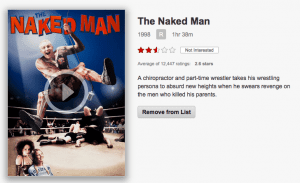
Imagine my disappointment, then, when I actually watched the thing and discovered that not only was it not terrible, but it was actually pretty good. For one thing, the main character wears a body suit inspired by anatomical diagrams, complete with muscles, bones, and internal organs; Naked Mideon could have used that gear years later. Aside from an insane murderous rampage at one of the house shows, it provides a pretty accurate depiction of the wrestling business. Plus, the whole thing is surreal and somewhat artsy, which shouldn’t be a surprise considering it was directed written by one of the Coen Brothers in between Fargo and The Big Lebowski. No, The Naked Man isn’t for everyone, but it’s also not crap, either.
It did get me curious about some of Michael Rapaport’s other films, though, and a search of his IMDB page yielded a 2011 crime drama called, “Inside Out,” which earned negative reviews. Alas, this was WrestleCrap and not MovieCrap, so unless, I don’t know, Shawn Michaels was busting heads in it…
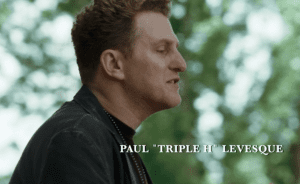
…eh, close enough.
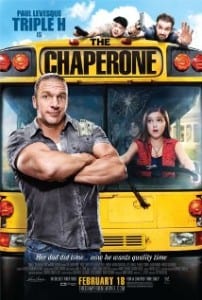
This quickly-forgotten footnote in WWE history was overshadowed by another, somewhat similar Triple H vehicle, The Chaperone, which preceded it by seven months.
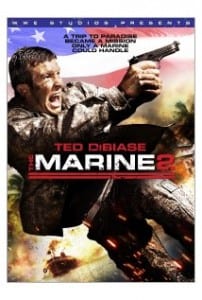
See, there are only so many genres WWE Films is able to pull off — movies about Marines…
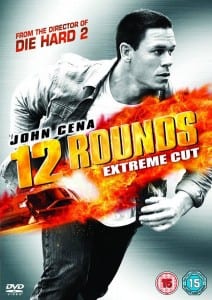
…movies about John Cena saving his kidnapped wife or girlfriend…
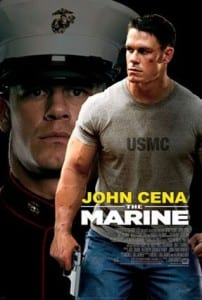
…movies about both…

…movies about a kid wetting his pants and Randy Orton threatening to go to the papers about it (or so I gathered from the commercials)…
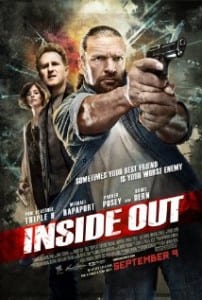
…and, for about a year, movies about Triple H getting out of prison and trying to fit back into family life.
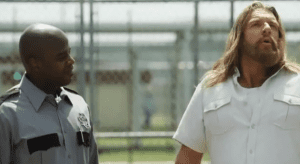
No joke: I spent the entire movie wondering what had happened to the scene where Hunter asks the prison guard the first thing people usually do when they get out of jail, and he answers, “Usually something stupid.” I assumed it had been cut from the final version, until about five minutes left in the movie, when I remembered that that line was from the trailer for “The Chaperone,” not “Inside Out.”
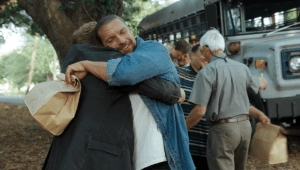
The fact that they both featured Trips on a bus certainly didn’t help, either.

The movie revolves around Triple H’s character, the recently-released inmate Arlo “AJ” Jayne, who gets in touch with his old buddy Jack Small (Rapaport). Small is married to Hunter’s ex, Claire, and their daughter, Pepper [Author’s note: 6 months later, I just noticed that I said Jack was married to his own daughter. Actually, he lives with her]. Triple H for some reason can’t figure out that the high-school-aged daughter of his girlfriend from 13 years prior is, in fact, his own daughter, even though any viewer with a first-grade understanding of arithmetic (and a fifth-grade understanding of reproduction) can see it coming. He’s probably just amused that she shares a name with Al Snow’s chihuahua.

By the way, I call him “Triple H” and not, “Arlo Jayne” because while watching, not for a second could I suspend my disbelief that the main character wasn’t Hunter Hearst Helmsley. The Game shows less emotional range in this entire film than in a typical promo, displaying approximately three emotions: cool and collected, slightly perturbed, and in physical pain.
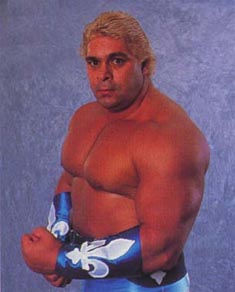
Michael Rapaport’s character tries to get Triple H back into the life of crime, this time through cigarette-smuggling, a safer alternative to drug-dealing that never hurt anyone.
Rapaport’s lines all seem to have been written by an automatic gritty-dialogue-generator. An automatic gritty-dialogue-generator that doesn’t understand how merry-go-rounds traditionally work on this planet. And which hasn’t been updated since the Bush administration.
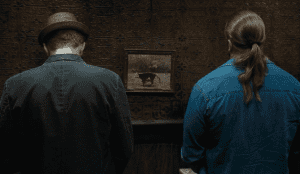
Rapaport’s dad, a cigarette-smuggling kingpin, moonlights as a vet and, if I’m not mistaken, The Count’s understudy on Sesame Street. Vic Small secretly thinks his own son is an idiot and would much rather have the more intelligent and competent Triple H take over the family business when he’s gone. You know, maybe I’ll stop being so critical of this movie; after all, for his first shot at ghostwriting a screenplay, this is pretty good for Hunter.
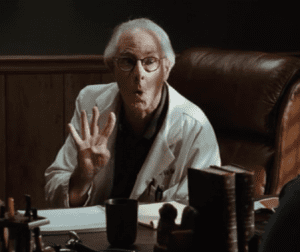
Oh, yeah, and there’s one more thing this movie revolves around: pickles. Triple H comes back from prison with not only a jar of pickles, but a secret recipe for great pickles that he hopes to make a living off now that he’s on the outside. Hunter keeps bringing up the pickles, and somehow always with a straight face.

The only reason I can fathom for the pickle motif in this movie is that, as HHH explains, you have to wait a long time to get good pickles, even though he hates waiting. Perhaps the pickles represent his family? But even if that’s the case, couldn’t the writers have come up with a metaphor more, what’s the word, less stupid?
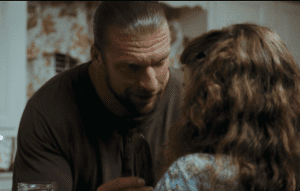
Actually, I can think of one other thing the pickles might symbolize, judging by Parker Posey deep-throating one in the kitchen.

Anyway, on a routine cigarette deal with Pickle H in tow, Rapaport’s character waves a totally-unnecessary gun around and — would you believe his luck? — coughs on some whiskey and accidentally fires his pistol, shooting his customer in the stomach.
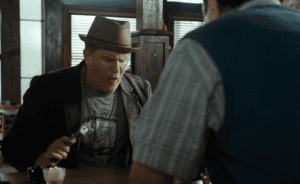
The guy is dead by the end of the scene, allowing Jack to take the 250 grand for himself and setting off the chain of events that form this film’s plot. Yes, the whole movie, with all its ensuing bloodshed and felonies, hinges on a single inconvenient cough. Kind of makes you paranoid this allergy season, huh?
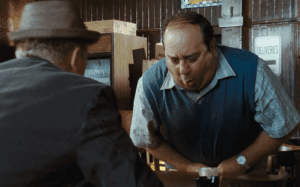
After the cigarette buyer croaks, we find out he was an informant whose loot came from the IRS. We are introduced to a new character, a tax collector who has been investigating all those tax cheats smuggling cigarettes to avoid paying their fair share. If you’ve ever wondered what Irwin R. Schyster’s character would have gotten up to had he stuck around and continued evolving like The Undertaker, here’s a pretty good guess.

None of the other tax guys are interested, because, after all, cigarettes are legal (and none of them are familiar with the concept of tax evasion). You half-expect the IRS suits to tell her that she won’t be one of the cool kids unless she smokes. But the tax lady, who looks and sounds like Dixie Carter (right down to the wooden acting) insists that her operation is worth the effort. After all, cigarettes are killing her father. And Osama Bin Laden makes money off smuggled cigarettes! You know, speaking of the IRS, I’m starting to suspect this movie was made to double as a PSA and serve as a tax deduction.

In an attempt to give characters a measure of emotional depth while killing two birds with one set, both the tax lady’s dad and Triple H’s mom are living at Bodhisattva Hospice, one of the best end-of-life-care facilities in Lousiana run by Buddhists and named for a Steely Dan song. I hear it ranks up there with The Reelin’ in the Years Home for the Dying in Shreveport.
Anyone?
Moving on.
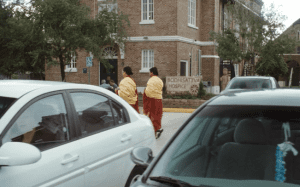
To avoid the cops, Rapaport flees to his secret hideout shack, but not before running over a cop, which should look really bad for Triple H, who has a history of hiring goons to do that sort of thing.

But if the cops knew the real Triple H, I mean, Arlo Jayne, they would know that he would never hurt a fly, except for that one guy he accidentally killed 13 years earlier, and even that was just to save his best friend’s life. I’m pretty sure I saw more complexity in Hunter’s character in just the trailer for The Chaperone than in this entire movie.
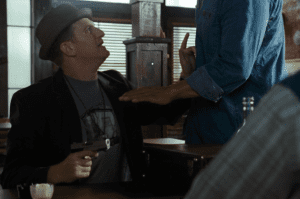
Come to think of it, for the ostensible main character, Hunter barely does anything in this movie, instead just habitually being in the wrong place at the wrong time while other characters kill each other. That, and disposing the occasional body. Isn’t that just the last thing you’d want a cop to find in your trunk? I mean, besides pickles.
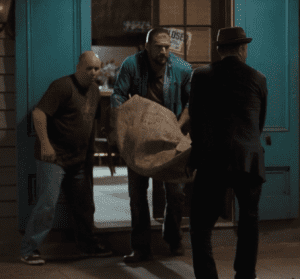
Despite being completely innocent and upstanding, Triple H has never met a gun he didn’t like… or at least shook hands with. Even though Hunter’s character is so blameless that he never ever actually fires a gun, that doesn’t stop him from handling every gun he ever stumbles across in the film — including those from multiple crime scenes — usually to eject the clip so no one gets hurt. It’s a good thing no cops ever dust those weapons, since in the 13 years Hunter has been in jail, the police have developed a sophisticated forensic technique called, “fingerprinting.”
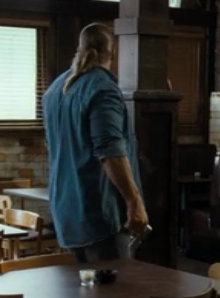
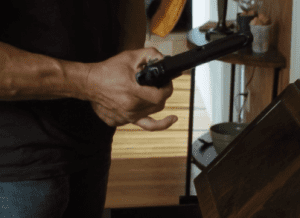
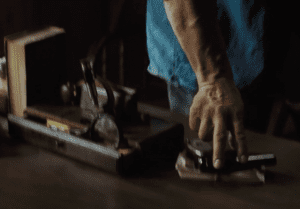

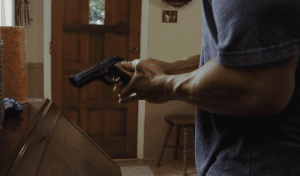
Around this time, Vic’s female bodyguard manages to beat up the bartender who witnessed the informant’s death, then tie him up in record time with duct tape in comical fashion. By the way, wasn’t Batista originally slated to star in this movie?
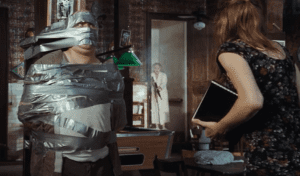
The bartender’s mother comes to the rescue in a scene that looks like it came from “Stop or My Mom Will Shoot” but was in fact shot for this non-comedy film. Oh, and she and her son get blown up anyway.

Meanwhile, with a homicide charge facing Rapaport, the dimwitted crime heir shoots himself a la Tim White, only successfully and on the first try. Nobody wants to have to bury their best friend, especially not Triple H. It’s like Badd Blood ’03 all over again!
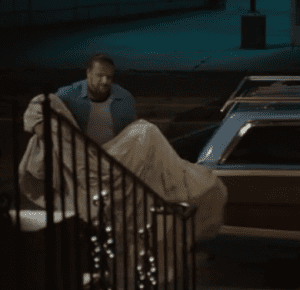
Hunter comes home to break the news to Claire, who lets it slip that, surprise, Pepper is his daughter, not his dead buddy’s. They immediately proceed to stage two of the grieving process, which is of course boning.
*Ahem*
Oh great, I just accidentally fired my gun during that editorial cough! There goes my monitor…

The next morning, Pepper comes home to find her dad’s ex-con friend in bed with her mom —

— but not before eating a delicious pickle.

Mom then explains aloud again to Triple H, with daughter listening secretly behind the door, that he is Pepper’s biological father before blaming him for being such a bad friend to Jack. Then she shoots him in the gut. Pretty loyal for a woman who commemorated her husband’s suicide by putting out that very night.
With his best friend.In their marriage bed.
At this point, I should note that this film got the same PG-13 rating as The Chaperone.

Jeez, there are still ten minutes left, and the main character is dead? But no! See, the exact wound that killed the chubby cigarette guy in seconds fails to level The Game, who bandages himself right damn up and drives back to his and Claire’s love nest.

Unbeknownst to him, however, Irena the bodyguard is hiding in the backseat waiting to kill off the last witnesses against Vic.
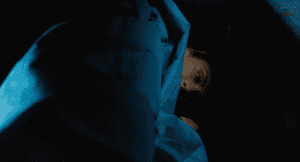
Maybe if he had had his eyes open on the drive there, he might have noticed her.
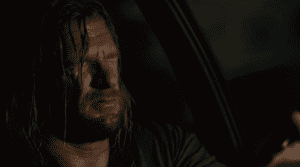
When a wounded Hunter arrives at the shack by the swamp, he is greeted by Claire, who, after reading Jack’s suicide note clearing him of any and all wrongdoing and probably putting over his superior workrate in the bedroom, apologizes and rushes him into the house. Also in the house is Pepper, who has been a real good sport about finding out that her dad is dead, that Triple H is her real dad, and that her mom just tried to kill him, too.
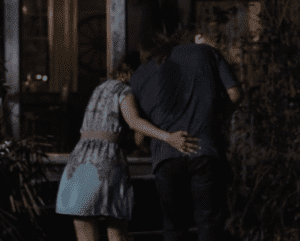
Hunter, for his part, is also a really good sport about the whole shooting thing from five minutes earlier in the movie, marking the cinema’s quickest-forgiven attempted murder since The Room. With that kind of Christ-like cheek-turning, it’s no wonder he calls himself the King of Kings.
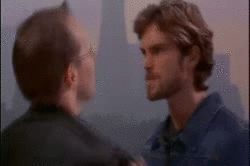
Hunter then sees in his car a sign saying, “Ka-Boom!”, which is either some tasteless viral marketing for the old Billy Mays cleaning product, or Irena’s calling card.
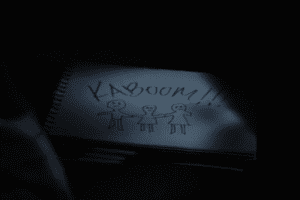
Evil or not, you’ve got to admire the woman’s skill with explosives; she had just seen the house for the first time, and not two minutes later, she had already gotten it rigged up to explode!
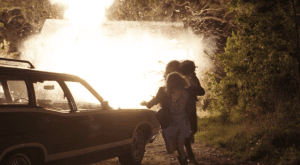
Irena then tries to kill Hunter by hand, but is thwarted by a bullet to the back by Pepper. The family is safe, but more importantly, Hunter is able to keep intact his Batman-like record of zero gun shots while celebrating his offspring’s first kill.
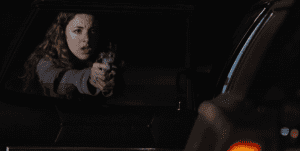
Oh yeah, and they keep the stolen 250 grand in cash (presumably to build a new life around fermented cucumbers), which won’t get them into any trouble, unless the IRS or the cops ever decide to track down the missing money, in which case they’ll be the number one suspects.

All in all, while this movie isn’t quite as ghastly as Jim Cornette’s clothes…

…it’s clearly not that damn good, either.
On a scale of one to ten, I’ll give it…
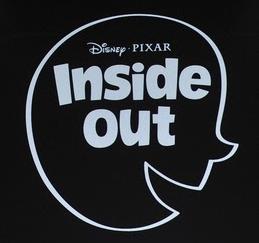
…about one year before it slips into total obscurity once this Pixar movie comes out.

